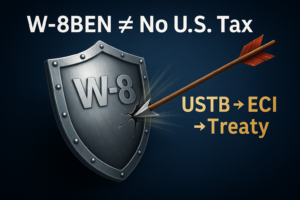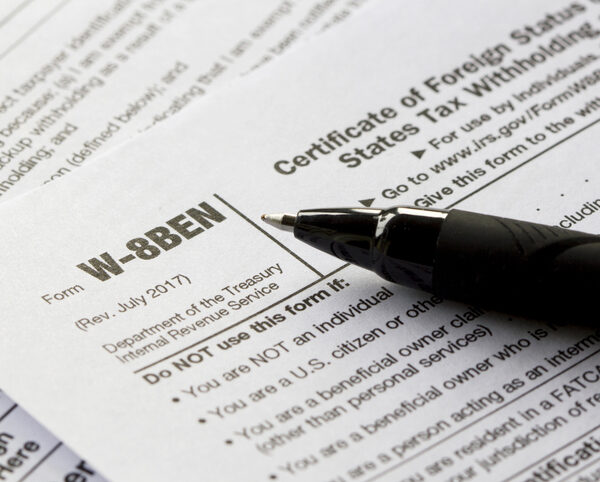U.S. tax compliance for non-resident Amazon and TikTok sellers is complex. Two sellers can have similar operations but different outcomes based on their U.S. activity, their filing posture, and state rules.
There is no one-size-fits-all answer. After working with leading U.S. tax attorneys and CPAs, here are the most common areas where confusion leads to over- or under-payment of U.S. taxes. Use this as a guide, then book a strategy call to confirm what fits your facts.

1) Thinking W-8BEN or W-8BEN-E Means No U.S. Tax Obligation
W-8 forms certify foreign status for withholding. They do not decide whether you must file a U.S. return or owe tax. Filing and tax depend on your facts, in this order.
USTB – U.S. Trade or Business
You have a USTB when your U.S. activity is considerable, continuous, and regular. You do not need your own office or a contract-signing agent to meet this threshold. Owning inventory positioned in the United States and selling year-round through U.S. fulfillment is a high-risk USTB pattern even when Amazon or a 3PL is independent. Risk rises if you or your team use U.S. space for returns or kitting, or a U.S. person can bind orders, prices, credits, or concessions.
ECI – Effectively Connected Income
Test ECI only after USTB exists. Income is ECI if either the business-activities test is met or the asset-use test is met.
- Business-activities: U.S. activities are a material factor in earning the income.
- Asset-use: income is derived from assets used or held for use in the U.S. business, such as your inventory in U.S. FBA or 3PL facilities used to fulfill orders.
- Resellers source by title passage. U.S. title leads to U.S. source. Producers source by place of production.
- Foreign-source sales can still be ECI if attributable to a U.S. office that materially participates, including a dependent agent’s home office imputed to you.
Treaty overlay
If you are treaty-resident, U.S. tax on business profits generally applies only if you have a Permanent Establishment in the United States. Using an independent agent helps at the treaty layer, but you still need to file a return and attach Form 8833 to claim the treaty. States are separate and are not bound by treaties.
Bottom line: submitting a W-8 to Amazon does not settle your U.S. tax obligations. Your U.S. activities do. If those activities indicate USTB and your sales are ECI, you must file and compute tax on net profit, or file with Form 8833 if you qualify for a no-PE claim under a treaty. The right answer depends on your evidence and goals.
2) Assuming No 1099-K Means the IRS Does Not Know About Your Sales
Amazon may not issue Form 1099-K to W-8 sellers, but that does not make your sales invisible. The IRS can match data from marketplace systems, customs import records, processors and wires, and other sources. Do not rely on the absence of a 1099-K.
3) Filing 1040-NR or 1120-F With Form 8833 to Claim No Permanent Establishment
What most miss
- Treaty PE rules apply to the enterprise of a treaty resident. That can be a foreign individual or a foreign company.
- If a U.S. single-member LLC is disregarded, the owner is the taxpayer for treaty purposes. A foreign individual owner files Form 1040-NR. A foreign corporate owner files Form 1120-F.
The correct order
- USTB under domestic law. If you do not have USTB, you generally do not have ECI and do not need Form 8833 for business profits.
- ECI and source. If USTB exists, apply reseller and producer sourcing rules and office attribution.
- Treaty PE. If treaty-resident and no PE, and you meet limitation-on-benefits, you may claim exemption for business profits by filing and attaching Form 8833.
When not to attach Form 8833
- Only attach Form 8833 if you are taking a treaty-based position such as USTB but no PE.
- If you truly conclude no USTB, you generally do not take a treaty position. Some sellers still file a protective 1040-NR or 1120-F to preserve deductions and start the statute, but without 8833.
If you misuse it
- Late or baseless treaty claims risk denial, back tax, penalties, and interest.
- Missing a timely return can cost deductions, turning a net-income tax into something close to a gross-receipts assessment.
4) Believing No U.S. Office Means No U.S. Tax Obligation
You can have USTB without leasing an office if a U.S. dependent agent habitually concludes or binds contracts, or if you or your staff regularly perform core work in the United States through recurring in-person services.
Inventory in Amazon FBA or a true 3PL alone is not an automatic answer, but year-round U.S. fulfillment of your inventory is a high-risk USTB and ECI pattern under the business-activities and asset-use tests. Then test sourcing and office attribution, and apply the treaty overlay if you are eligible. States are not bound by treaties.
If your facts are near the line, especially with FBA or 3PL, get a second opinion and decide whether a full treaty filing or a protective posture fits your goals.
5) Working With a CPA Who Does Not Specialize in Non-Resident E-commerce
Exposure turns on a three-step analysis: USTB, then ECI and source, then treaty PE. Missteps include importing treaty PE concepts into domestic USTB, treating FBA inventory as always or never USTB, skipping the order, forgetting Form 8833 for a real treaty claim, and overlooking state income or franchise rules. Many advisors still file when you conclude no USTB to start the statute, preserve deductions if the IRS later asserts USTB, and reduce notice risk from marketplace matching. Attach Form 8833 only when actually claiming no PE.
6) Getting the Dependent Agent Rule Right
Domestic vs treaty
- Domestic USTB can exist if a U.S. person habitually binds contracts or terms for you. No lease is required.
- Treaty PE can arise if a person habitually concludes contracts or plays the principal role. For a disregarded SMLLC, the owner is the treaty enterprise.
Guardrails
- FBA or 3PL alone is not an automatic USTB or PE answer. Year-round U.S. fulfillment of your inventory is high-risk and must be evaluated.
- ECI requires USTB first. After USTB, apply sourcing and office attribution. Foreign-source sales can still be ECI if attributable to a U.S. office that materially participates.
Final thoughts
Two sellers can run the same model and reach different outcomes based on facts, risk tolerance, structure, and filings. If you sell through a U.S. LLC or a foreign company and are unsure of your position, get a second opinion before filing. The best path forward usually follows a short discovery and a tailored plan rather than a generic checklist.
Many new non-resident sellers struggle to open a U.S.-LLC Amazon account with a U.S. address while operating from another country. Unless you can document a real U.S. operational presence, not a virtual or CMRA mailbox, identity verification may stall. In many cases it is cleaner to register as a non-U.S. seller with your home-country entity, or to build U.S. substance before applying with a U.S. LLC.
Disclaimer
This post is for informational purposes only and is not tax or legal advice. Every business is unique. The right answer depends on your facts. Consider a strategy call to determine what is best for your situation.


